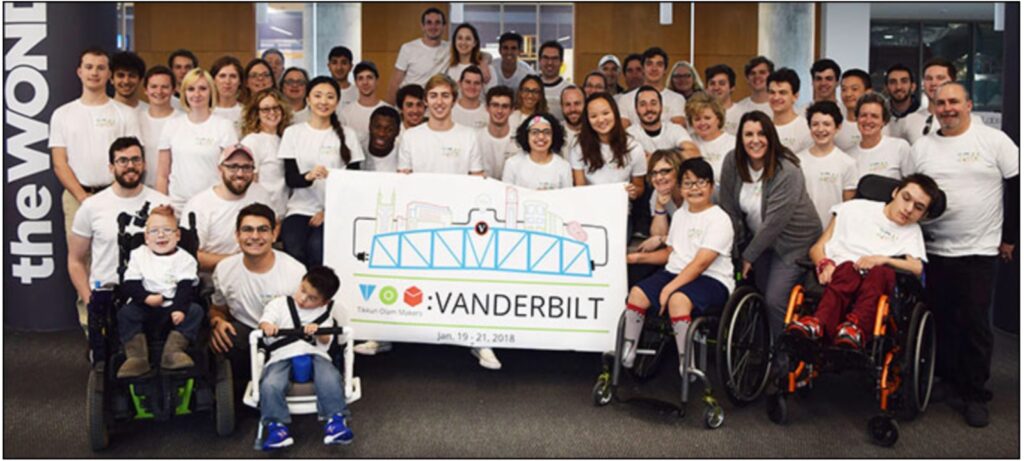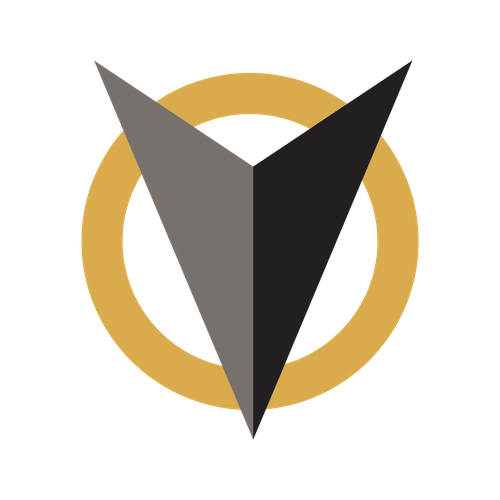Wonder in the Wond’ry:
Vanderbilt’s Medical Make-a-thon
Erica Guelfi | February 12, 2023

If you visited the Wond’ry (Vanderbilt’s makerspace and design center) last November, you likely heard the hustle and bustle of a workplace in motion. Right at the center you could find Hugh, a bright-eyed 9-year-old full of personality, intently staring at the computer screen while using his newly designed mouse to watch Goat Simulator videos. Hugh has two clubbed hands, making use of a regular mouse difficult for him, as he cannot easily move the mouse and push the buttons at the same time. Innovations such as this were the norm that weekend, thanks to Vanderbilt’s Tikkun Olam Makers (TOM) club on campus.
Tikkun Olam Makers is a global organization, with 70 chapters worldwide. The Vanderbilt chapter is a relatively new addition, started in 2017 by a dedicated group of students. They set out to create a space for engineering-minded students to give back to the greater Nashville community each year. This culminated in a makeathon, an event where students work diligently from Friday to Sunday to innovate and create pieces of medical technology to help community members affected with disabilities. This race against the clock culminated in a fair where all the assistive devices are presented and then sent home with their new users.
Students meet with their need-knower (a term for the person receiving the care) once before the makeathon to dive deep into the struggles that their disability presents in their daily life. This process allows the need-knower to explain the specifics of their problem and give input into the feasibility of proposed solutions. Students then use their design skills to model a few final concepts that will be explored throughout the makeathon.
The issues addressed in these makeathons are everyday issues faced by the need-knowers, such as buckling a seatbelt or taking notes in class. To a fully-abled person, these tasks are mundane and effortless, but for disabled need-knowers they present a hurdle in the way of their self-reliance. For many need-knowers, these projects serve as a method of taking control into their life, allowing them to perform tasks on their own without the help of caregivers.
The best part? All designs created in the makeathon are stored in an online database, where they are all free to be recreated by other TOM chapters. This open-source approach to healthcare means that chapters can take inspiration from each other, improving on existing designs to deliver an even more polished and cohesive final product to the need-knower.
While these events obviously have a positive effect on the need-knowers, they also enrich the lives of students. While you will certainly see many engineers participating in the organization, students of all disciplines come together to enact positive change in the world. Many students even form long-term bonds with certain need-knowers, working with them year after year to create devices for new medical challenges that have arisen. The program allows students to practice a variety of design skills and gives them a tangible final product to feel proud of. In the end, the projects help both the student and the need-knower, creating a symbiotic relationship where the student can put their classroom knowledge to use in a hands-on project while the need-knower receives an assistive device for free. The makeathon is an opportunity for Vanderbilt students to create lasting change in the community around them, changing lives for the better.
Citation for media: https://engineering.vanderbilt.edu/news/2019/weekend-inventors-will-build-tech-for-people-with-disabilities/
